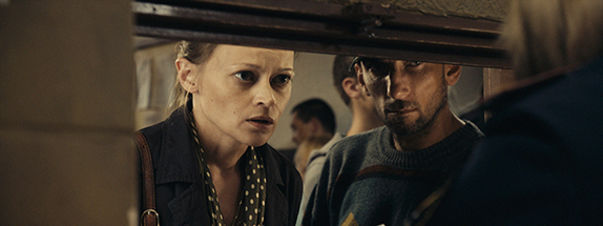A woman against the machine
By Alexandra João Martins

Still from A GENTLE CREATURE
A GENTLE CREATURE, by Sergei Loznitsa, unravels the trajectory of a character facing Kafkaesque events.
What can totalitarian states do? Based on the homonymous tale by Fyodor Dostoevsky, A GENTLE CREATURE by Sergei Loznitsa brings to the screen the story of a woman who, in the eternal search for her husband, imprisoned by the regime, finds herself facing multiple obstacles throughout this mission, which we will see, is impossible. This impossibility of a woman (and not the woman) rejected by the community is only one of the issues raised by the Ukrainian filmmaker.
The history of art (including literature, music, cinema and theater) is summoned masterfully by the director and transverses the film’s plasticity, starting, right away, from the loose literary adaptation. It is felt in the apocalyptic late afternoon and in the Tarkovsky-like pantanal scenery, in the living picture of a woman doing household chores lit by a Flemish painting, as well as in the traditional Soviet songs (but also in opera). The tragedy is pre-announced by the almost uninterrupted presence of the choir – most of the characters don’t even have a name – revealed in the out-of-frame sonorization and in the frames sequences, exemplary in the train and in the prison.
As in IN THE FOG, war, or, here, its permanent possibility (nuclear missiles and the USA are spoken of), haunts this decrepit prison-city, whose map is a trajectory of communist ideologists and in which the idea of justice does not seem to be confronted with its sense of morality. "Why did you go to jail? For nothing. Why were you convicted? Murder." Losnitza shows the totalitarian state apparatus through individuals – cynical, perverse, embedded in the system – who cross this woman’s path and hurdle her mission, for no apparent reason, in Kafkaesque processes. Suggesting that one only fulfills oneself as they begin to inhabit an intimate and everyday dimension, indicating, through small hints (for instance, a modern car in the background), an analogy with contemporary Russia.

